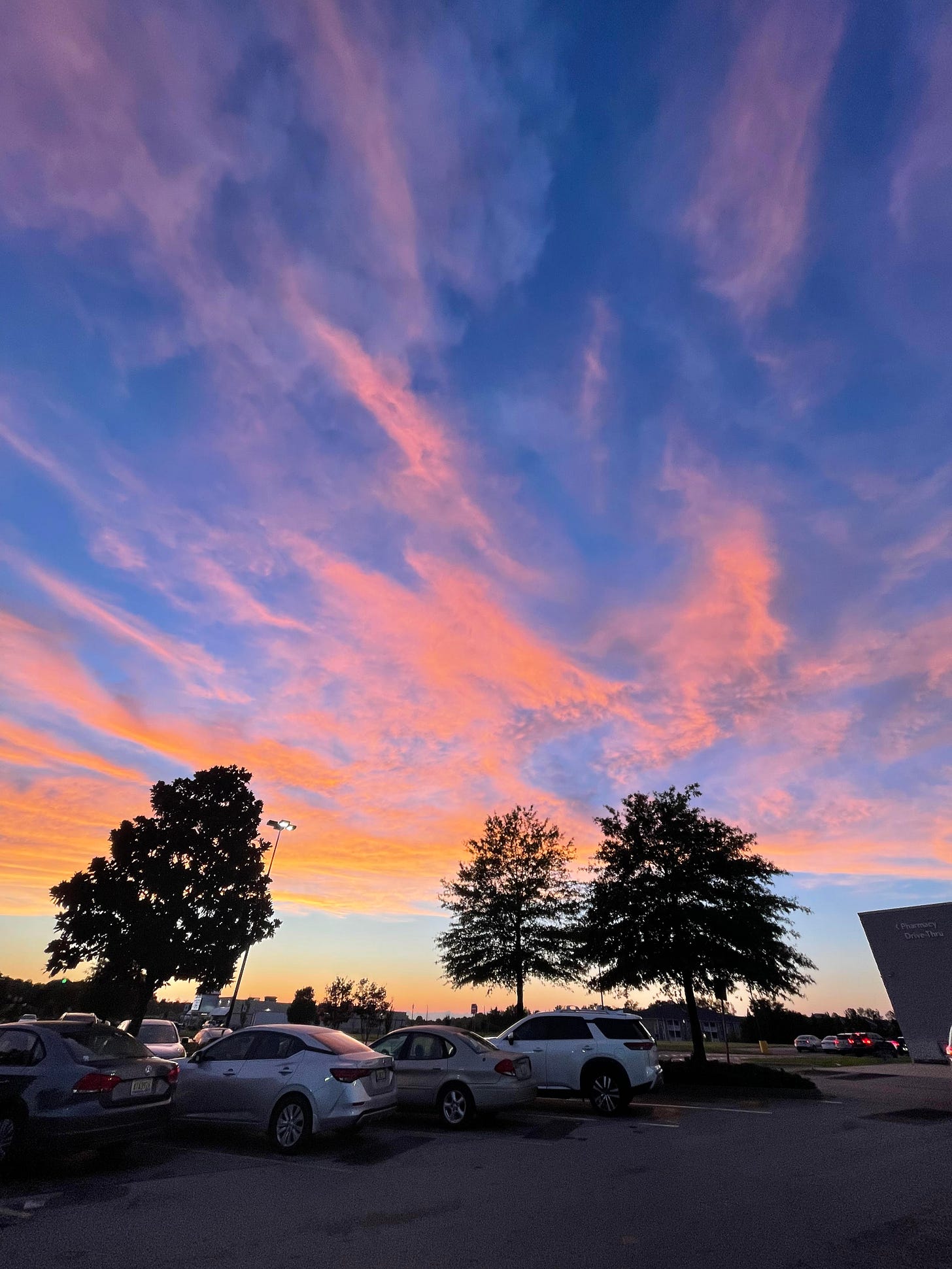When was the last time you truly felt a sense of wonder?
For me, it was this past Monday, walking out of Walmart.
I know—it’s the last place you’d imagine inspiring awe. Especially on a Monday evening after a long day of work, exercise, and general life overwhelm.
But we’ve had an onslaught of gnarly weather this summer in North Alabama, and something I’ve figured out is that nasty storms, when timed right, can make for breathtaking sunsets.
That’s what we were greeted with Monday evening, as we rolled our cart of groceries across the parking lot. Sure, sunsets happen every day, but this one actually stopped me in my tracks—I had to pause the conversation I was having with my husband to take it all in properly. I think after several days of gloomy skies (it’s thundering again as I write this) I was more grateful than usual to experience that beauty.
Wonder deserves more credit.
It’s the thing I feel when I’m on top of a mountain, or looking at the ocean. I’m told it’s the thing you experience when your first child is born. It’s also the thing at the heart of true worship, that overwhelming feeling that you’re participating in something transcendent.
It’s also the closest thing to describe the feeling I had when I first started to understand how philosophy and science can actually point us back to the divine.
For too long, I believed the lie that modern academia had nothing to offer to Christianity. I don’t know where that lie came from, and there’s no use in pointing fingers now. But, somewhere along the line, I had taken on the belief that these disciplines would point me away from God rather than toward him.
Similarly, many will claim that people don’t come to faith through philosophical arguments, but I don’t buy it. Sure, my faith had roots that predated my path crossing with apologetics. But when I was in the depths of doubt during my college years, apologetics was the thing that restored my hope and fortified my faith.
Even now, I attribute my confidence in my faith in part to the strength of those arguments. There’s an underrated power in the ability of every discipline, from mathematics to literature to biology, to point back to the Creator.
One of the most common apologetics arguments you’ll come across is the Kalam Cosmological Argument (KCA). Despite its name, the argument itself is quite simple. I’ll walk through the premises and what they mean below. But first…
Defining some terms
Kalam is the Arabic word for speech. It’s part of this argument’s title to pay homage to the Muslim philosophers who contributed to its development around the 700s AD. As Islamic philosophy continued to grow, the word kalam grew to encompass the entire school of thought.
Cosmology is the study of the beginning of the universe. While its modern applications are well-known—many conversations in the field of astronomy have a cosmological flavor—at its core, it seeks to answer one of humanity’s most pervasive questions: How did all this get here?
So, “kalam” denotes the argument’s ancient lineage, while “cosmological” describes the topic that the argument is derived from and addresses.
Understanding the premises
The KCA goes like this:
Everything that begins to exist has a cause.
The universe began to exist.
Therefore, the universe has a cause.
Typically, opponents of the KCA try to discredit the argument by attacking Premise 2, that the universe began to exist. Philosophers throughout history have argued this point ad nauseam, with every culture contributing their thoughts to the discussion. I find it interesting that the Judeo-Christian tradition assumes the truth of this point by default with the powerful opening statement, “In the beginning…”1
Once Premise 2 is defended, we can turn our attention to Premises 1 and 3. Premise 1 is a bit easier to conceptualize. In our experience, things don’t just come into existence willy-nilly. The most important thing to note about Premise 1 is its specific wording: “Everything that begins to exist has a cause.”
Premise 3, then, follows from Premises 1 and 2. Since the universe began to exist, something must have caused it.
But what is that cause? I’m sure you can see where I’m going here, but I want to pause for a minute to point out that, technically, Premise 3 is the end of the argument. In my opinion, that’s one of the most exciting things about the KCA—it ends on a cliffhanger.
Solving the mystery
Here’s where this philosophical argument enters the world of apologetics. In The Blackwell Companion to Natural Theology, William Lane Craig and James D. Sinclair detail two final premises that tie up the loose ends left by the traditional argument:
If the universe has a cause, then an uncaused, personal Creator of the universe exists, who sans the universe is beginningless, changeless, immaterial, timeless, spaceless, and enormously powerful.
Therefore, an uncaused, personal creator of the universe exists, who sans the universe is beginningless, changless, immaterial, timeless, spaceless, and enormously powerful.
“This, as Thomas Aquinas was wont to remark, is what everybody means by ‘God,’” the writers conclude.
Returning to wonder
When I first internalized the implications of the KCA, I couldn’t feel anything less than wonder. During my junior year of college, when I was the most confused about my faith, I spent months watching debates, listening to arguments, and trying to understand my Bible.
My sense of wonder had never betrayed me—I could never look at a sunset and not think there was something, someone, else out there. But in those moments, I needed something more. Through this argument and others, God revealed himself to me in a new and beautiful way, showing me his complexity while also allowing me to experience his perfect, personal love.
O Lord my God, when I in awesome wonder
Consider all the worlds Thy hands have made;
I see the stars, I hear the rolling thunder,
Thy power throughout the universe displayed.Then sings my soul, my Savior God, to Thee,
How great Thou art.
A recommendation for you:
First, another meme:

And then, a YouTube video that explains it (while also defending Premise 2):
The modern version of the argument around the universe’s beginning gets metaphysical very quickly. There’s also a significant scientific component to the argument, which is also in its favor—basically, many physicists are relatively certain that the universe did, indeed, have a beginning.






